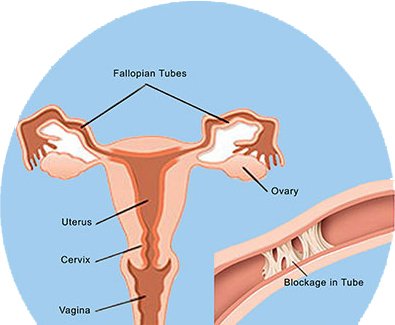Tuboplasty
Tuboplasty is a surgical method that opens or reopens the fallopian tubes to allow for conception. Because a blocked fallopian tube is a prevalent cause of female infertility, most tuboplasty procedures are performed to boost the odds of reproduction in women who may have had problems getting pregnant. A tuboplasty can not only remove a blockage but can also restore a damaged fallopian tube. The surgeon may be able to remove the injured piece of the fallopian tube and stitch the healthy areas back together during the procedure. It is frequently necessary to remove a blockage in one of the tubes, which might occur around the tube’s junction with the uterus or towards the tube’s end. Fallopian tube obstructions can occur as a result of scar tissue formation, infections like TB/ STI, or previous surgery.

What condition needs tuboplasty surgery??
A variety of factors might cause the fallopian tubes to become obstructed or damaged. Pelvic inflammatory disease and Tuberculosis is the most common cause of the blockage. Other reasons a tuboplasty may be required include:Endometritis
Adhesions
Infections after childbirth
Infections of the abdomen, such as appendicitis or peritonitis
While TB causes infection of the uterus and fallopian tubes in women, this infection is generally asymptomatic and may not present any symptoms or signs at all. It eventually leads to infertility. Among other symptoms, the difficulties may include bleeding discharge and ulcers.
What are the different types of tuboplasty surgery?
Tuboplasty can be classified into the following categories.Salpingolysis is the surgical removal of adhesions from around the tube (caused due to endometriosis).
Tubal reanastomosis is the excision of blocked tubal tissue and the joining of healthy Fallopian tube segments.
Cornual implantation is the removal of a damaged component of the tube and the direct connection of the distal patent segment of the Fallopian tube to the uterus, where it meets the endometrial cavity.
Fimbrioplasty is the process of removing fimbriae from joints (finger-like projection in the lumen which helps the movement of egg).
Salpingostomy procedure entails creating a new distal entrance for the Fallopian tube.
How is tuboplasty performed?
Diagnostic imaging studies, such as X-rays or ultrasound, are conducted before tuboplasty to enable the surgeon to precisely view the location of obstruction or damage. Tuboplasty is usually done laparoscopically, through a small incision below the belly button, with a compact camera and tiny surgical equipment. Tuboplasty may involve the removal of scar tissue, the construction of a new opening within the tube, the removal of a growth or other obstruction, or resection to remove a damaged portion, depending on the patient’s specific circumstances. Tuboplasty is often performed laparoscopically, which results in less discomfort and blood, less scarring, and a shorter recovery period.
Recover time for Tuboplasty procedure
The amount of time it takes to recover varies from case to case. Tuboplasty can be performed as an outpatient procedure, which means the patient can go home the same day. The patient is allowed to eat and walk on the same day. The ideal time to conceive after such a surgery is in the months immediately after the procedure.
What is the Tuboplasty Success Rate?
The success rate of this operation is determined by several factors. When we evaluate our patients for tubal repair, we review the tubal ligation report to establish the feasibility and probable success rate in their specific situation.
However, because the majority of women who have had a tubal ligation have no other reproductive issues, reopening their tubes is often enough to restore fertility. This will provide them the opportunity to conceive every month.
The time it takes to conceive varies on the person, but most patients can become pregnant within six months following the surgery. Conception success rates after tuboplasty surgeries can reach as high as 65 percent one year after the treatment.
For unexplained infertility or Tubal blockage surgery book your appointment today with Dr.ANSHUMALA SHUKLA, one of the renowned gynecologists in Mumbai at Kokilaben Dhirubhai Ambani Hospital.
